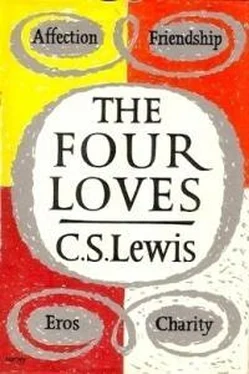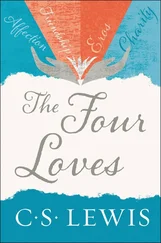But it is not only children who react thus. Few things in the ordinary peacetime life of a civilised country are more nearly fiendish than the rancour with which a whole unbelieving family will turn on the one member of it who has become a Christian, or a whole lowbrow family on the one who shows signs of becoming an intellectual. This is not, as I once thought, simply the innate and, as it were, disinterested hatred of darkness for light. A church–going family in which one has gone atheist will not always behave any better. It is the reaction to a desertion, even to robbery. Someone or something has stolen "our" boy (or girl). He who was one of Us has become one of Them. What right had anybody to do it? He is ours . But once change has thus begun, who knows where it will end? (And we all so happy and comfortable before and doing no harm to no one!)
Sometimes a curious double jealousy is felt, or rather two inconsistent jealousies which chase each other round in the sufferer's mind. On the other hand "This" is "All nonsense, all bloody high–brow nonsense, all canting humbug". But on the other, "Supposing—it can't be, it mustn't be, but just supposing—there were something in it?" Supposing there really were anything in literature, or in Christianity? How if the deserter has really entered a new world which the rest of us never suspected? But, if so, how unfair! Why him? Why was it never opened to us? "A chit of a girl—a whipper–snapper of a boy—being shown things that are hidden from their elders?" And since that is clearly incredible and unendurable, jealousy returns to the hypothesis "All nonsense".
Parents in this state are much more comfortably placed than brothers and sisters. Their past is unknown to their children. Whatever the deserter's new world is, they can always claim that they have been through it themselves and come out the other end. "It's a phase," they say, "It'll blow over." Nothing could be more satisfactory. It cannot be there and then refuted, for it is a statement about the future. It stings, yet—so indulgently said—is hard to resent. Better still, the elders may really believe it. Best of all, it may finally turn out to have been true. It won't be their fault if it doesn't.
"Boy, boy, these wild courses of yours will break your mother's heart." That eminently Victorian appeal may often have been true. Affection was bitterly wounded when one member of the family fell from the homely ethos into something worse—gambling, drink, keeping an opera girl. Unfortunately it is almost equally possible to break your mother's heart by rising above the homely ethos . The conservative tenacity of Affection works both ways. It can be a domestic counterpart to that nationally suicidal type of education which keeps back the promising child because the idlers and dunces might be "hurt" if it were undemocratically moved into a higher class than themselves.
All these perversions of Affection are mainly connected with Affection as a Need–love. But Affection as a Gift–love has its perversions too.
I am thinking of Mrs. Fidget, who died a few months ago. It is really astonishing how her family have brightened up. The drawn look has gone from her husband's face; he begins to be able to laugh. The younger boy, whom I had always thought an embittered, peevish little creature, turns out to be quite human. The elder, who was hardly ever at home except when he was in bed, is nearly always there now and has begun to reorganise the garden. The girl, who was always supposed to be "delicate" (though I never found out what exactly the trouble was), now has the riding lessons which were once out of the question, dances all night, and plays any amount of tennis. Even the dog who was never allowed out except on a lead is now a well–known member of the Lamp–post Club in their road.
Mrs. Fidget very often said that she lived for her family. And it was not untrue. Everyone in the neighbourhood knew it. "She lives for her family," they said; "what a wife and mother!" She did all the washing; true, she did it badly, and they could have afforded to send it out to a laundry, and they frequently begged her not to do it. But she did. There was always a hot lunch for anyone who was at home and always a hot meal at night (even in midsummer). They implored her not to provide this. They protested almost with tears in their eyes (and with truth) that they liked cold meals. It made no difference. She was living for her family. She always sat up to "welcome" you home if you were out late at night; two or three in the morning, it made no odds; you would always find the frail, pale, weary face awaiting you, like a silent accusation. Which meant of course that you couldn't with any decency go out very often. She was always making things too; being in her own estimation (I'm no judge myself) an excellent amateur dressmaker and a great knitter. And of course, unless you were a heartless brute, you had to wear the things. (The Vicar tells me that, since her death, the contributions of that family alone to "sales of work" outweigh those of all his other parishioners put together). And then her care for their health! She bore the whole burden of that daughter's "delicacy" alone. The Doctor—an old friend, and it was not being done on National Health—was never allowed to discuss matters with his patient. After the briefest examination of her, he was taken into another room by the mother. The girl was to have no worries, no responsibility for her own health. Only loving care; caresses, special foods, horrible tonic wines, and breakfast in bed. For Mrs. Fidget, as she so often said, would "work her fingers to the bone" for her family. They couldn't stop her. Nor could they—being decent people—quite sit still and watch her do it. They had to help. Indeed they were always having to help. That is, they did things for her to help her to do things for them which they didn't want done. As for the dear dog, it was to her, she said, "just like one of the children." It was in fact as like one of them as she could make it. But since it had no scruples it got on rather better than they, and though vetted, dieted and guarded within an inch of its life, contrived sometimes to reach the dustbin or the dog next door.
The Vicar says Mrs. Fidget is now at rest. Let us hope she is. What's quite certain is that her family are.
It is easy to see how liability to this state is, so to speak, congenital in the maternal instinct. This, as we saw, is a Gift–love, but one that needs to give; therefore needs to be needed. But the proper aim of giving is to put the recipient in a state where he no longer needs our gift. We feed children in order that they may soon be able to feed themselves; we teach them in order that they may soon not need our teaching. Thus a heavy task is laid upon this Gift–love. It must work towards its own abdication. We must aim at making ourselves superfluous. The hour when we can say "They need me no longer" should be our reward. But the instinct, simply in its own nature, has no power to fulfil this law. The instinct desires the good of its object, but not simply; only the good it can itself give. A much higher love—a love which desires the good of the object as such, from whatever source that good comes—must step in and help or tame the instinct before it can make the abdication. And of course it often does. But where it does not, the ravenous need to be needed will gratify itself either by keeping its objects needy or by inventing for them imaginary needs. It will do this all the more ruthlessly because it thinks (in one sense truly) that it is a Gift–love and therefore regards itself as "unselfish".
It is not only mothers who can do this. All those other Affections which, whether by derivation from parental instinct or by similarity of function, need to be needed may fall into the same pit. The Affection of patron for protégé is one. In Jane Austen's novel, Emma intends that Harriet Smith should have a happy life; but only the sort of happy life which Emma herself has planned for her. My own profession—that of a university teacher—is in this way dangerous. If we are any good we must always be working towards the moment at which our pupils are fit to become our critics and rivals. We should be delighted when it arrives, as the fencing master is delighted when his pupil can pink and disarm him. And many are.
Читать дальше











